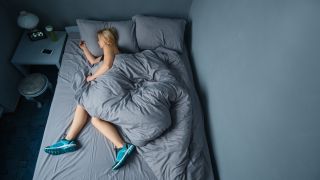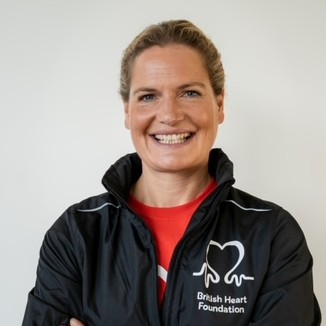How To Get To Sleep The Night Before The London Marathon
You’re going to be nervous, excited and relatively well rested, so your best bet might actually be to go to bed later than usual

Marathon runners will try all sorts of different things to boost their performance during a race. That starts with obvious things like training for three to four months and fuelling well during the race so they don’t run out of energy, and extends to splashing out a lot of money on the best carbon plate running shoes to add some spring to their step.
However, sleeping well in the days leading up to the race can also be very important, not only to ensure you have the physical energy to power through your marathon, but also to give you the mental energy to make good decisions during the race, like not starting the 26.2-mile run at your 5K pace.
We spoke to sleep scientist Dr Sophie Bostock about the importance of sleep for running performance, and to get her advice on how to get to sleep the night before a marathon. Bostock is a member of the British Heart Foundation London Marathon support squad, a team of experts supporting the charity’s runners at the 2022 marathon.

Dr Sophie Bostock received a Bachelor of Medical Sciences in medicine from Nottingham University, and stayed on at the institution to earn an MSc in entrepreneurship. She has also completed a PhD in health psychology at University College London and has held the title of honorary research associate at the Sleep & Circadian Neuroscience Institute at the University of Oxford, collaborating on various research projects. She is also a member of the American Academy of Sleep Medicine and the British Sleep Society and is the founder of TheSleepScientist.com, which consults with employers, professional sports teams and healthcare providers to help people understand the science of sleep and how to use it to their benefit.
It’s not surprising to learn that a lack of sleep can affect your physical performance – a systematic review of studies indicated sleep deprivation can result in a 7.5% drop in performance – but Bostock also highlighted how your cognitive performance can be negatively impacted.
“We tend to be a lot more impulsive – we have less emotional regulation when we’re short of sleep. So things like decisions about sticking to your race plan can be affected,” says Bostock.
With that in mind, we assumed that getting to bed particularly early the night before the race would be a smart move. But in fact the best advice is just to stick to your normal routine, or even go to bed later than usual.
“Hopefully, you’ve got a relatively regular bedtime and a relatively regular wake time, and I would try and stick to whatever you normally do,” says Bostock. “If you find that you are just way too excited and you’re not sleepy, don’t just lie there in bed worrying about it. I often actually tell people just go to bed a bit later if they’re not feeling sleepy. Maybe read for a little bit longer, distract yourself.
Get the Coach Newsletter
Sign up for workout ideas, training advice, reviews of the latest gear and more.
“Also, the night before a race, positive imagery can be really helpful. Picture yourself having a really successful race, seeing yourself going around the course feeling great. Instil positive emotions in your head. That’s actually going to help you to relax and if you are tired, you’re going to find it easier to fall asleep.”
Bostock also pointed out that, given you’ll probably be tapering and exercising less just before the marathon, you might have more energy than usual – another good reason to perhaps go to bed 20-30 minutes later than you have been during heavy training weeks.
Given that many runners will probably be a bag of nerves the night before the race, there is a case for trying to bank a few extra hours of sleep earlier in the week.
“In the days and even weeks leading up to the marathon, getting that little bit of extra sleep is going to make you more resilient to the sleep loss the night before,” says Bostock, though she did also say that for most people getting in “sleep credit” usually just means actually sleeping as much as they should be.
Sleep is important, then, and you should do what you can to get a lot of it in the week before your marathon, but another key takeaway is that you shouldn’t fret too much if you don’t sleep very well the night before your race.
“By that time you’ve done the work,” says Bostock. “Most of the studies that look at the impact of sleep deprivation on performance have done something pretty extreme – no sleep at all for 30 hours, or a really prolonged sleep loss. Very often we actually find even with these controlled experiments that one night of slightly shorter sleep probably doesn’t make that much difference. And the compensation that you’re going to get from the adrenaline on the day is probably going to be strong enough.”
You’ll feel that adrenaline from the moment you wake up on race day, and you can also counter the effects of a bad night’s sleep with some positivity.
“There was a study published recently that looked at the impact of positive versus negative self-talk and showed that positive self-talk reduces your rate of perceived exertion,” says Bostock. “Remember you’ve done the work, you’ve trained hard. That one night of short sleep probably doesn’t make much difference. I’ve spoken to so many athletes who have done their personal best or even broken records after a poor night of sleep.”
One last bit of advice is if you use a sleep tracker, the night before a marathon might be a good time to take it off.
“Whatever happens, whatever that tracker says, you’re going to have to do that race,” says Bostock. “So it might be a good time to take a break from it.”
- Tips For London Marathon First-Timers
- The Runner’s Guide To The London Marathon Route

Nick Harris-Fry is a journalist who has been covering health and fitness since 2015. Nick is an avid runner, covering 70-110km a week, which gives him ample opportunity to test a wide range of running shoes and running gear. He is also the chief tester for fitness trackers and running watches, treadmills and exercise bikes, and workout headphones.
